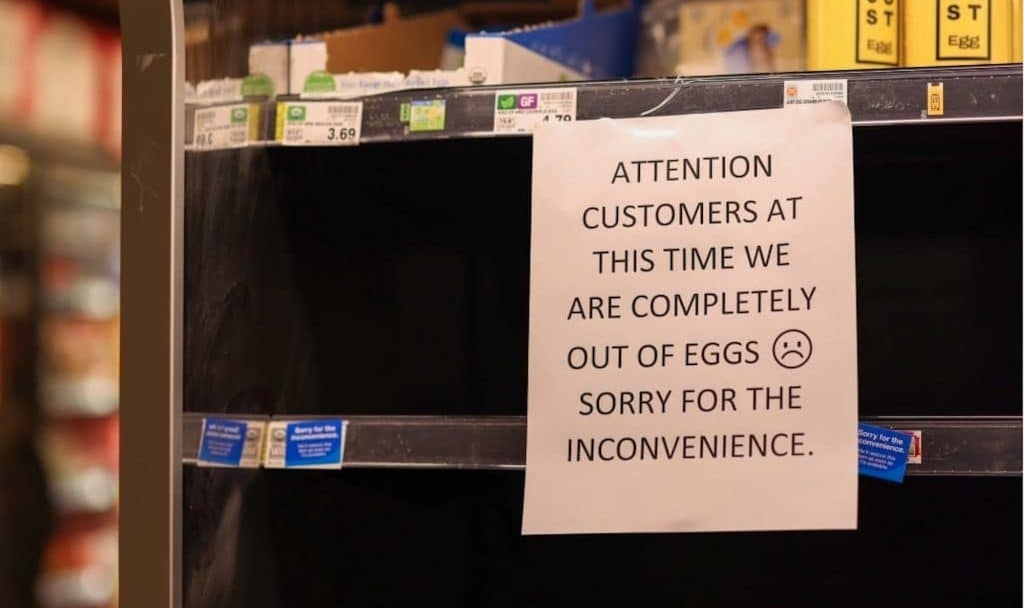
Welcome dear science-appreciative reader,
When Avian Influenza H5N1 is detected in one chicken on an egg farm, it and all of the tens of thousands of other chickens there are destroyed. Over 50 million birds in the U.S. were destroyed this way last year. ¿Why not vaccinate chickens? It isn’t expensive. It’s because eggs and chickens sold for food are tested for infection and the vaccine causes a positive result. A vaccinated bird appears to be an infected bird and cannot be exported for food. ¿What is the danger of eating an infected bird or egg? None – if it is cooked properly, but possibly fatal if undercooked. Less than one thousand people worldwide are known to have become ill from avian flu H5N1, but half of them died of the disease. With each human infection – indeed with each mammalian infection – it becomes more likely that a highly contagious variant could evolve and initiate a deadly pandemic. Already the H5N1 virus has been found in otters, dolphins, grizzly bears, minks, foxes, and seals. Most likely, these predators became infected not by contagion but by eating infected wild birds. Even large bats eat wild birds.
¿Is there a long-term solution to our egg shortage issue? An NYU professor believes so.
Speaking of viruses and vaccines, the Anti-Vaxx movement is alive and well and the subject of the movie Virulent: The Vaccine War. Currently, it is available only at private screenings. Jonathan Jarry of McGill University wrote an insightful review. In it, Jarry mentions that a children’s hospital was ‘attacked’ by anti-vaxxers, and the “hospital put together a toolkit on how to prepare for, defend against, and clean up after this kind of organized warfare.” On Thursday of this week, there is a free livestream presentation, “The Cultural Logic of Vaccine Refusal” by Dr. Jennifer Reich that is sponsored by the Bay Area Skeptics. Submit your questions to Dr. Reich during the presentation.
The next topic takes us away from disease and death to talk about sex. But first, here’s a nifty segue: Death by Sex.
1. Some insectivorous plants lure their prey apparently by using sex pheromones.
2. Researchers suspect that male marsupial Northern Quolls (Dasyurus hallucatus) rarely survive to their second breeding season because of their over-the-top sexual desire and frenzied mating.
Some people, at some times, have little sexual desire. That’s pretty normal, but if it really bothers that person, then it is called a psychological disorder; HSDD Hypoactive Sexual Desire Disorder. Who knew? Well, pharmaceutical companies know and are working on a ‘cure.’ Kisspeptin is a chemical that shows some promise. ¿Kiss?peptin. Actually, the chemical got its name from Hershey Kisses since it was first isolated in a Hershey, Pennsylvania laboratory near where Hershey’s Chocolate factory is located. The chemists had no inkling that the substance might influence desire; just a coincidence.
Michelle H’s guess of 842 was closer to the random generator’s 833 than guesses of the other 20 contestants. Michelle won a levitating globe gizmo. This time we’re offering a constellation coffee mug from The Unemployed Philosophers Guild. Empty, the mug displays stars. When filled with a hot liquid, the stars are identified by constellations. Just send an email to david.almandsmith [at] gmail.com (only one) before noon Friday with an integer between zero and 1,000. We will then use a random number generator to select the target number and mail the mug to the person who chose the closest number.
My Picks of the Week
– Insect Decline & the Importance of Insect Conservation Rohnert Park Monday Noon
– Beginning Birding Livestream Monday 7pm
– Searching for Life on Mars Livestream Tuesday 3:30pm
– Where’s the love? The Secrets of Chimpanzee Relationships Livestream Wednesday 6pm
– The Cultural Logic of Vaccine Refusal Livestream Thursday 7:30pm
– Water Equity, Affordability & Climate Change Livestream Friday 12:30pm
An article came out last week concerning mimosa leaf folding (not mimosa making). The next time you meet a mimosa plant, Mimosa pudica (from the Latin for “shy or bashful;” same root as for pudendum), take a moment to touch a ‘leaf’ and watch it fold up. Some minutes later it will unfold itself. The article reports on the anatomy of the ‘muscles’ that accomplish the folding.
Science Friday on February 3rd had a segment on “The Last of Us,” an apocalyptic TV series where people become zombie-like when infected by the fungus Cordyceps. (A recording of the segment will be available in a few days.) The mycologist, Dr. Patty Kaishian, was Ira Flatow’s guest on the segment who admitted to loving fungi. Indeed Cordyceps fungi are (in)famous for taking over control of various insect species for purposes of reproduction. Dr. Kaishian complimented the show for getting a lot correct – except that after many millions of years of evolution, none of the 600 species of Cordyceps has managed to enslave humans and is not likely to do so – anytime soon.
Fun nerdy videos:
The Right Chemistry: Melatonin 5 mins
Veritaseum: Can Humans Sense Magnetic Fields 14 mins
Sabine Hossenfelder: Hydrogen Will Not Save Us 20 mins
NOVA PBS: Can this Cuttlefish Pass an Intelligence Test? 10 mins
If you are not already a subscriber to the weekly SciSchmooze, just enter your email address at bayareascience.org.
Have a great week surrounded by well-watered trees and wildflowers,
Dave Almandsmith
Bay Area Skeptics
“If you are thinking a year ahead, sow seed. If you are thinking ten years ahead, plant a tree. If you are thinking one hundred years ahead, educate the people.”
– Kuan-Tzu, Chinese poet (ca. 500 BCE)
Upcoming Events:
Click to see the next two weeks of events in your browser.

